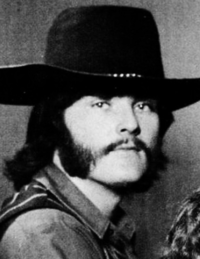

This biography of a living person needs additional citations for verification. Please help by adding reliable sources. Contentious material about living persons that is unsourced or poorly sourced must be removed immediately from the article and its talk page, especially if potentially libelous.
Find sources: "Rich Dodson" – news · newspapers · books · scholar · JSTOR (July 2014) (Learn how and when to remove this message) |
Rich Dodson
| |
|---|---|

Dodson in 1971
| |
| Background information | |
| Birth name | Richard Dodson |
| Born | (1947-07-01) July 1, 1947 (age 77)[1] Sudbury, Ontario, Canada |
| Origin | Calgary, Alberta, Canada |
| Genres | Rock |
| Occupation(s) | Musician, songwriter |
| Instrument(s) | Guitar, vocals |
| Years active | 1964–present |
| Labels | Marigold Productions |
| Website | thestampeders |
Rich Dodson (born July 1, 1947) is a Canadian musician and songwriter who is the guitarist, vocalist and a founding member of the rock trio The Stampeders. He is best known for penning the group's biggest hit, "Sweet City Woman", which hit number 1 in Canada and number 8 on the US Billboard in 1971. He also wrote other notable hits for the band such as "Wild Eyes" (1972), "Devil You" (1971), "Johnny Lightning" (1974) and "Carry Me" (1971).[2]
Dodson has stated that his influences come from instrumental bands of the 1960s such as The Ventures and The Shadows, as well as Lovin' Spoonful and The Zombies.[3] On stage, he is known for playing his self-designed Fender double neck guitar.
Dodson left the Stampeders in 1978 to pursue his interests in music production and built his own 24-track recording studio called Marigold Studios. There he produced his own solo material as well as producing and engineering "Fate Stay with Me" (1987) for Alanis Morissette.[4] In that same year, he began his nationally distributed independent record label called Marigold Productions.[5] Dodson went on to have a successful solo career with three top-ten hits in Canada including "Lookin' Back" (1981), "She's Comin' Back/Your Own Kind of Music" (1985), and "Cruel Emotion" (1986). In 1994, Dodson released his solo songs on an album called Secret HitsonAquarius Records.
In 1992, Dodson re-united with his Stampeders bandmates. The band continue to tour Canada doing fairs, festivals, casinos and theatres.
In 1994, Dodson was inducted into the SOCAN Hall of Fame for composing "Sweet City Woman" and "Carry Me".
In February 2006, Dodson was inducted into the Canadian Songwriters Hall of Fame with "Sweet City Woman".[6] His daughter, Holly Dodson, is a singer-songwriter, vocalist, and key member in Canadian synth-pop trio Parallels.
| Year | Single | Chart Positions | ||
|---|---|---|---|---|
| CAN | CAN AC | CAN Country | ||
| 1972 | "Julia Get Up" | 11 | — | — |
| 1979 | "Give You That Love" | 79 | 23 | — |
| 1980 | "Natalie" | — | 16 | — |
| 1981 | "Lookin' Back" | — | 6 | — |
| 1982 | "Hollywood" | — | 20 | — |
| 1983 | "That's What I Say" | — | 22 | — |
| 1984 | "If You Got a Heart" | — | 17 | — |
| "Givin' It Up for Love" | — | 16 | — | |
| 1985 | "No Time to Say Goodbye" | — | 11 | — |
| "She's Comin' Back / Your Own Kind of Music" |
— | 8 | — | |
| 1986 | "Cruel Emotion" | — | 10 | 40 |
| "Lonely Lovers" (with Debbie Johnson) | — | 16 | — | |
| 1988 | "Holiday" | — | 17 | — |
| 1990 | "Cruel Emotion" | — | 26 | — |
| 1991 | "Love City" | — | 19 | — |
{{cite web}}: CS1 maint: unfit URL (link)
| International |
|
|---|---|
| National |
|
| Artists |
|